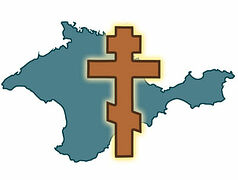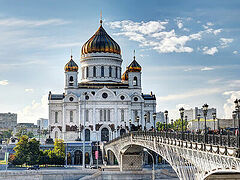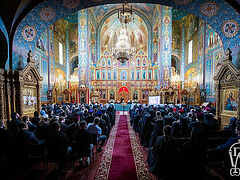Moscow, June 7, 2022
The Holy Synod of the Russian Orthodox Church is concerned about the possibility of a schism within the canonical Ukrainian Orthodox Church following the change to its Statutes and Church status at the Council of the Ukrainian Orthodox Church held in Kiev on May 27.
This is the second time the Russian Synod has addressed the situation arising from the Ukrainian Council, having previously met on May 29, just two days after the Council.
Only a Local Council of the Russian Orthodox Church (including hierarchs, clerics, monastics, and laity) has the authority to change the status of the Ukrainian Orthodox Church, the Russian Synod reminds in its resolutions from today’s meetings. The Synod thus expresses its support to all in the Ukrainian Church who “strive to adhere to the order defined by the Gramota” of Ukrainian autonomy from 1990, including commemorating His Holiness Patriarch Kirill in the Divine services.
Recall that several Ukrainian dioceses had already suspended commemoration of the Patriarch since the beginning of the fratricidal war in late February. And at the Council on May 27, the requirement to commemorate the Patriarch was completely removed from the Ukrainian Church Statutes, and His Beatitude Metropolitan Onuphry of Kiev and All Ukraine no longer commemorates Pat. Kirill as the patriarchal authority over him, but as one of many Orthodox primates with whom he shares canonical communion.
At the same time, several dioceses in Crimea and the territories claimed by the Donetsk and Lugansk Republics have rejected the changes and continue to commemorate the Patriarch, with the blessing of Met. Onuphry.
And today, the three dioceses of the Ukrainian Church in Crimea were received directly into the Russian Church by request of their ruling hierarchs.
Having considered the Ukrainian Church situation, the Russian Synod resolved today:
-
To note with regret the continuing pressure on the bishops, clergy, monastics, and laity of the Ukrainian Orthodox Church by representatives of the Ukrainian state authorities and the extremist part of Ukrainian society.
-
To express support to all bishops, clergy, monastics, and laity of the Ukrainian Orthodox Church who, realizing the need to observe the canonical order, strive to adhere to the order defined by the Gramota of His Holiness Patriarch Alexei II of Moscow and All Russia dated October 27, 1990, and the canonical norm of commemoration at the services of the Patriarch of Moscow and All Russia (see Canon 15 of the First-Second Council). [See below for the text of the Gramota and the text and interpretation of Canon 15.]
-
To remind that the decision to change the status of the Ukrainian Orthodox Church can be made only within the framework of the canonical procedure, including a resolution of a Local Council of the Russian Orthodox Church. To emphasize that arbitrary actions to change the status of the Ukrainian Orthodox Church could lead to a new schism within it. The Synod of the Ukrainian Orthodox Church also drew attention to this, indicating in its statement of May 12, 2022, that any discussions concerning the life of the Ukrainian Orthodox Church should take place within the canonical field and should not lead to new divisions in the Church.
-
To call upon all bishops, clergymen, monastics, and laity fervent prayer for the preservation of Church unity.
***
We, the humble Alexei II, by the grace of God, Patriarch of Moscow and All Russia, together with all the Right Reverend bishops of the Russian Orthodox Church-Moscow Patriarchate, gathered for the Bishops’ Council on October 25-27, 1990 at Danilov Monastery in the God-saved city of Moscow, guided by the desire to have blessed peace, the love of Christ, and fraternal unity in the common work in the field of God with the plenitude of the Ukrainian Orthodox Church, taking into account the desire and intercession of her Right Reverend archpastors, who gathered on July 9, 1990, in the God-saved city of Kiev to discuss and resolve their Church life on the basis of independence and autonomy, bless the Ukrainian Orthodox Church, through this Gramota, by the power of the All-Holy and Life-Giving Spirit, to henceforth be independent and autonomous in its governance, and you, unanimously elected on July 9, 1990, by the episcopate of the Ukrainian Orthodox Church, to be its primate.
We hope that the Ukrainian Orthodox Church will be governed according to the Divine and sacred Canons and the customs of the Orthodox Catholic Church inherited from the Holy Fathers and the definitions of this Bishops’ Council. With one heart and with one mouth, we pray to the Lord, our Chief Shepherd, for the Heavenly help and blessing of the holy Orthodox Ukrainian Church.
May the Ukrainian Orthodox Church, united through our Russian Orthodox Church with the One, Holy, Catholic, and Apostolic Church, not change anything about the dogmas of the faith and the holy canons without a conciliar decision of the entire plenitude of the Orthodox Catholic Church.
May the Beneficent and Almighty Life-Giving Trinity, the Father, Son and Holy Spirit, always strengthen the holy Orthodox Ukrainian Church, crown it with glory and honor, and bless its existence for the salvation of its pious plenitude.
***
Canon 15 of the First-Second Council, held in Constantinople in 851:
The rules laid down with reference to Presbyters and Bishops and Metropolitans are still more applicable to Patriarchs. So that in case any Presbyter or Bishop or Metropolitan dares to secede or apostatize from the communion of his own Patriarch, and fails to mention the latter’s name in accordance with custom duly fixed and ordained, in the divine Mystagogy, but, before a conciliar verdict has been pronounced and has passed judgment against him, creates a schism, the holy Council has decreed that this person shall be held an alien to every priestly function if only he be convicted of having committed this transgression of the law. Accordingly, these rules have been sealed and ordained as respecting those persons who under the pretext of charges against their own presidents stand aloof, and create a schism, and disrupt the union of the Church. But as for those persons, on the other hand, who, on account of some heresy condemned by holy Councils, or Fathers, withdrawing themselves from communion with their president, who, that is to say, is preaching the heresy publicly, and teaching it barehead in church, such persons not only are not subject to any canonical penalty on account of their having walled themselves off from any and all communion with the one called a Bishop before any conciliar or synodal verdict has been rendered, but, on the contrary, they shall be deemed worthy to enjoy the honor which befits them among Orthodox Christians. For they have defied, not Bishops, but pseudo-bishops and pseudo-teachers; and they have not sundered the union of the Church with any schism, but, on the contrary, have been sedulous to rescue the Church from schisms and divisions.
Interpretation of the Canon, included in The Rudder of St. Nikodemos the Hagiorite:
The same rules as were prescribed in the above Canons with regard to bishops and Metropolitans, are prescribed, and so much the more so, by the present Canon with regard to Patriarchs. For it says that if any presbyter or bishop or Metropolitan should separate himself from the joint communion of his own Patriarch, and does not mention his name in accordance with custom (this applies, that is to say, to only the Metropolitan; for a presbyter mentions only the name of his bishop, and the bishop mentions only the name of his Metropolitan), before revealing the charges against their Patriarch to the Council, and before learning that he has been condemned by the Council — they, I say, shall all be completely deposed from office; the bishops and Metropolitans from every prelatic activity; the presbyters from every priestly activity. But these provisions are of effect if presbyters separate from their bishops, or bishops separate from their Metropolitans, or Metropolitans separate from their Patriarchs, on account of certain criminal charges, of fornication, say, of sacrilege, and of other serious crimes. If, however, the said presidents are heretics, and are preaching their heresy openly, and on this account those subject to them separate themselves, and even though it be before there has been any conciliar or synodal trial concerning the heresy, but are even deemed to deserve fitting honor as Orthodox Christians, since not only have they caused no schism in the Church on account of their separation, but have rather freed the Church from the schism and heresy of their pseudo-bishops. See also Ap. c. XXXI.
Follow OrthoChristian on Twitter, Vkontakte, Telegram, WhatsApp, MeWe, and Gab!





